The ASLE subvention and translation grant committee has announced the five ASLE member projects that have been awarded grants for 2024.
Subvention Grants fund innovative projects in ecocriticism and environmental humanities such as art installations, documentary film projects, digital humanities web projects, and book or article publication, and Translation Grants fund a translation into English, or from English into other languages, of relevant ecocritical or environmental humanities work that has been previously published.
Subvention Grants
Kate Huber, Irish Ecomedia: Empire and Environmental Justice in the Modernization of Postcolonial Ireland (provisional title)
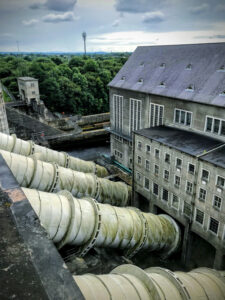 Huber’s book is forthcoming with the University of Virginia Press (Under the Sign of Nature series). This scholarly monograph explores how the foundational connections between colonialism and the environment rearticulate themselves in the modern era through multiple media and neocolonial forms of development. As Britain’s first and oldest colony, many colonial strategies, including plantation systems and partition, were tested in Ireland before being exported across the empire. Irish Ecomedia studies the environmental impacts of empire by tracing emerging media and modernization projects intended to develop Ireland’s economy and natural resources over the past century. Nineteenth-century agricultural and land reform projects encouraged beef production to support an industrializing England. To establish enclosed and privately owned farms, these projects displaced and encouraged the emigration of first-language communities, which often communally shared land. Such changes to the environment and people’s relationships to their surroundings established neocolonial economies that continued to persist after Ireland’s partial independence in 1922. Like their imperial-era counterparts, development projects in postcolonial Ireland facilitate the transition of multispecies environments into natural resources. In five chapters, Irish Ecomedia shows how artists, writers, musicians, and filmmakers draw on multiple media and Irish-language oralities to create more varied and enduring modernities. Through photography, literature, radio, and film, this book reveals socially just environmental relations that offer alternatives to colonial practices of enclosure and extraction that sacrifice peoples and places in the name of progress.
Huber’s book is forthcoming with the University of Virginia Press (Under the Sign of Nature series). This scholarly monograph explores how the foundational connections between colonialism and the environment rearticulate themselves in the modern era through multiple media and neocolonial forms of development. As Britain’s first and oldest colony, many colonial strategies, including plantation systems and partition, were tested in Ireland before being exported across the empire. Irish Ecomedia studies the environmental impacts of empire by tracing emerging media and modernization projects intended to develop Ireland’s economy and natural resources over the past century. Nineteenth-century agricultural and land reform projects encouraged beef production to support an industrializing England. To establish enclosed and privately owned farms, these projects displaced and encouraged the emigration of first-language communities, which often communally shared land. Such changes to the environment and people’s relationships to their surroundings established neocolonial economies that continued to persist after Ireland’s partial independence in 1922. Like their imperial-era counterparts, development projects in postcolonial Ireland facilitate the transition of multispecies environments into natural resources. In five chapters, Irish Ecomedia shows how artists, writers, musicians, and filmmakers draw on multiple media and Irish-language oralities to create more varied and enduring modernities. Through photography, literature, radio, and film, this book reveals socially just environmental relations that offer alternatives to colonial practices of enclosure and extraction that sacrifice peoples and places in the name of progress.
 Kate Huber is an assistant professor in the Department of Culture Studies at Tilburg University (Netherlands). She specializes in multimedia cultural analysis, postcolonial ecocriticism, eco-media studies, and transnational environmental justice, with a focus on anglophone Irish, African, and Caribbean literatures and cultures, including diaspora cultural production in Britain. Learn more about Kate’s teaching, research, and public outreach work at www.katehuber.org.
Kate Huber is an assistant professor in the Department of Culture Studies at Tilburg University (Netherlands). She specializes in multimedia cultural analysis, postcolonial ecocriticism, eco-media studies, and transnational environmental justice, with a focus on anglophone Irish, African, and Caribbean literatures and cultures, including diaspora cultural production in Britain. Learn more about Kate’s teaching, research, and public outreach work at www.katehuber.org.
Andrea Knutson, Castorcene: A Digital Wetland
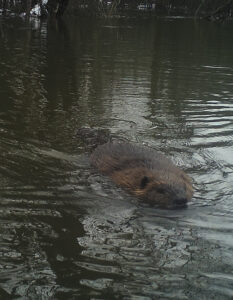 This is an ongoing ecomedia project that addresses many of the challenges that individuals and institutions face when beavers arrive on a landscape and coexistence is the choice that’s made. The website tracks the practical needs of coexistence (such as DNR permitting or installation of a water flow device), as well as the necessary education and awareness that addresses the panic and ignorance that typically follow beavers wherever they build a dam or lodge. Our digital wetland is also an opportunity for exploring the roles that the humanities and ecomedia can play in climate change. Beavers are ecosystem engineers and a keystone species. They build landscapes that are more resilient to climate change and create necessary habitats for 85% of wildlife, who depend on their wetlands. Their dams raise water tables, making environments more drought and fire resistant, and because their dams slow water flow, they help in purifying water and trapping sediment which removes toxins. They’re a central ally in mitigating climate change because their wetlands sequester carbon and improve hydrology. Yet, human-beaver entanglements are fast becoming a test of our willingness to decenter human agency and privilege for the sake of the planet and a multispecies future. This digital wetland documents this entanglement, tracks site specific progress in achieving co-existence, and explores an ethics of coexistence by creating new frameworks for sharing landscapes with beavers.
This is an ongoing ecomedia project that addresses many of the challenges that individuals and institutions face when beavers arrive on a landscape and coexistence is the choice that’s made. The website tracks the practical needs of coexistence (such as DNR permitting or installation of a water flow device), as well as the necessary education and awareness that addresses the panic and ignorance that typically follow beavers wherever they build a dam or lodge. Our digital wetland is also an opportunity for exploring the roles that the humanities and ecomedia can play in climate change. Beavers are ecosystem engineers and a keystone species. They build landscapes that are more resilient to climate change and create necessary habitats for 85% of wildlife, who depend on their wetlands. Their dams raise water tables, making environments more drought and fire resistant, and because their dams slow water flow, they help in purifying water and trapping sediment which removes toxins. They’re a central ally in mitigating climate change because their wetlands sequester carbon and improve hydrology. Yet, human-beaver entanglements are fast becoming a test of our willingness to decenter human agency and privilege for the sake of the planet and a multispecies future. This digital wetland documents this entanglement, tracks site specific progress in achieving co-existence, and explores an ethics of coexistence by creating new frameworks for sharing landscapes with beavers.
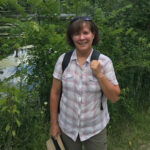 Andrea Knutson is an Associate Professor of English and Environmental Humanities at Oakland University in SE Michigan. She’s also the settler descendant co-chair of the Native American Advisory Committee, which oversees the development of the 4 acre Native American Heritage Site on campus as an inter-Tribal food sovereign, educational, and ceremonial cultural space. Her scholarship focuses on plantation ecologies within the British empire, sovereign spaces within the plantation complex, and archival traces that reveal the racial geographies of plantation.
Andrea Knutson is an Associate Professor of English and Environmental Humanities at Oakland University in SE Michigan. She’s also the settler descendant co-chair of the Native American Advisory Committee, which oversees the development of the 4 acre Native American Heritage Site on campus as an inter-Tribal food sovereign, educational, and ceremonial cultural space. Her scholarship focuses on plantation ecologies within the British empire, sovereign spaces within the plantation complex, and archival traces that reveal the racial geographies of plantation.
Chijioke K. Onah, Sacred Water (A Short documentary film)
Sacred Water is a documentary film that revisits Onondaga Lake’s pollution and its tributaries in Upstate New York. Given the notoriety of Onondaga Lake as America’s most polluted lake in the twentieth century and the various efforts to remedy the lake, the project hopes to understand the Native Onondaga nation’s perspective on the pollution of the lake and how the pollution has 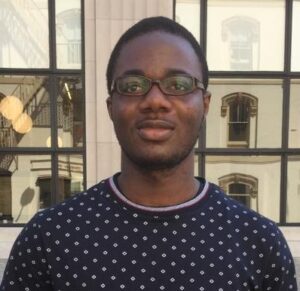 affected their community. In telling this story through the point of view of the Indigenous people for whom this water body holds enormous significance, the project ruptures the silencing of Indigenous knowledge and worldviews in the government record on Onondaga Lake. The film brings a new perspective to this issue, trying to understand the Onondaga Nation’s relationship to the lake.
affected their community. In telling this story through the point of view of the Indigenous people for whom this water body holds enormous significance, the project ruptures the silencing of Indigenous knowledge and worldviews in the government record on Onondaga Lake. The film brings a new perspective to this issue, trying to understand the Onondaga Nation’s relationship to the lake.
Chijioke K. Onah is a PhD candidate in Literatures-in-English at Cornell University, specializing in Global Black literature and the Environmental Humanities. He is the editor of an upcoming special issue of The Global South focused on “Toxic Ecologies of the Global South” (scheduled for publication in 2026). Chijioke is a recipient of the inaugural Mellon/ACLS Dissertation Innovation Fellowship and is currently writing his dissertation on “Toxic Intimacies: The (Bio)Politics of Waste in Africa and the African Diaspora.”
Translation Grants
Sean Manning, On Plants and Animals: A Literary Approach
On Plants and Animals by Ida Vitale (Uruguay, 1923) offers sixty short essays featuring an array of mammals, reptiles, birds, insects, and plants arranged like compartments in the author’s own herbarium-bestiary-library. Through a mingling of personal and literary anecdotes, she pays homage to the natural world by establishing a genealogy of eco-conscious thinkers across an extraordinary variety of generations, cultures, and languages. Its texts reflect the centenarian writer’s lifelong appreciation of nature, her own extensive bibliography of poetry and prose, and decades of prolific reading. But Ida Vitale is a renown poet —she received the prestigious Cervantes Prize in 2018— and these essays are not merely academic expositions on foxes, dolphins, eagles, hummingbirds, toads, chrysanthemums, dahlias, etc. They are eloquent constructions that blend poetry, prose, and criticism and employ the etymology, sonority, and polysemy of precise vocabulary to create her microscopic and telescopic vision of the often overlooked or undervalued elements of everyday life. On Plants and Animals voices Ida Vitale’s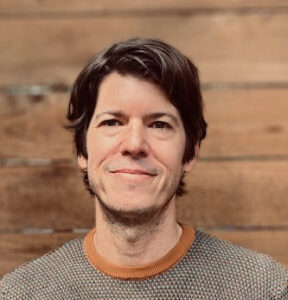 defense of the natural world, her rebuke of the indifferent or malevolent humans who do it harm, and her lament of life lost when the words that name it have been forgotten. The translation of On Plants and Animals will bring readers of English closer to each chapter’s titular wonder to inspire a greater awareness of its presence in their lives all the while exciting them with Ida Vitale’s masterful writing.
defense of the natural world, her rebuke of the indifferent or malevolent humans who do it harm, and her lament of life lost when the words that name it have been forgotten. The translation of On Plants and Animals will bring readers of English closer to each chapter’s titular wonder to inspire a greater awareness of its presence in their lives all the while exciting them with Ida Vitale’s masterful writing.
Sean Manning is a translator from Spanish and French. His translations include works by such authors as Ida Vitale, Carlos Pereda, Eduardo Lalo, Édouard Glissant, Azahara Palomeque, and Ricardo Piglia. He has a PhD in Spanish and Latin American literature from the University of Texas at Austin, where he is currently a lecturer teaching courses on language, literature, and writing.
Sonakshi Srivastava, Mera Pedh Banna (How I Became a Tree)
Before embarking on an insightful investigation of how she became a tree, Sumana Roy (2017, 1) quotes from Czelaw Milosz, “not that I want to be a god or a hero. Just change into a tree, grow for ages, not hurt anyone” to highlight that her desire to become a tree is not unique to her. The Miloszian sentiment, and Roy’s expressed reasons that initiated her arboreal transformation find resonance in her predecessors like Yeong-hye, and Sampath, the protagonists of “The Vegetarian” by Han Kang and “Hullabaloo in the Guava Orchard” by Kiran Desai respectively. Roy’s book is a compelling narrative that weaves together memoir, ecocriticism, indigenous philosophy, and science. It is also richly layered with intertextuality, and Roy organically stitches together fragments that make boundaries between the human and nonhuman porous, prompting the readers to extend their attention and care to their arboreal kins. Given the book’s acclaimed success in English, it merits a Hindi translation for it to be made available to a wider readership, especially for its 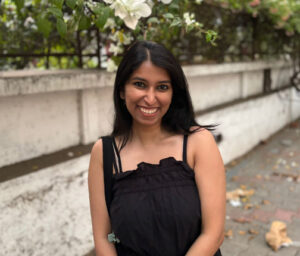 engagement with the scholarly community within the scholars of Hindi ecocriticism. The extensive bibliography that accompanies Roy’s work is also crucial to be made known to Plant Humanities enthusiasts and scholars who are unable to engage with the text because of the language barrier.
engagement with the scholarly community within the scholars of Hindi ecocriticism. The extensive bibliography that accompanies Roy’s work is also crucial to be made known to Plant Humanities enthusiasts and scholars who are unable to engage with the text because of the language barrier.
Sonakshi Srivastava is a senior writing tutor at Ashoka University. She is the Translations Editor at the Usawa Literary Review, and an educational arm assistant at Asympotote. She has previously been a translation fellow with the South Asia Speaks programme, and is generally enthusiastic about environmental humanities and discard studies.
We would also like to thank the Grants Committee for their work, it was a challenging process to review more than 40 applications!
